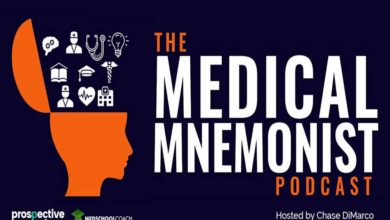Dr. Saud Siddiqui, founder of SketchyMedical, discusses the effectiveness of several different study techniques and how to improve information recall using the method of loci.
- [00:50] Early Beginnings of SketchyMedical
- [02:55] Using Thematic Scenes for the Memory Palace Technique
- [07:38] Improving Information Recall Using Different Study Techniques
- [12:46] Sketchy’s Approach to Step 2 CK & CS Learning
- [17:13] Dr. Siddiqui’s Experience as Medical Student Entrepreneur
- [21:46] Additional Tips for Studying & Clinical Rotations
Chase DiMarco talks to Dr. Saud Siddiqui, the CEO and one of the co-founders of SketchyMedical. They discuss the effectiveness of different study techniques and how to improve information recall using the method of loci. Dr. Siddiqui also shares SketchyMedical’s company journey and his experience as a medical student entrepreneur.
Founding Story of SketchyMedical
SketchyMedical was founded by Dr. Siddiqui and his friends while they were still in medical school. They found it difficult to keep up with school requirements using only traditional study methods. When they tried to incorporate art, humor, and stories into learning, their school performances improved. They shared this new study technique to other friends in medical school.
Before Sketchy had an online platform, it started off as a YouTube channel with explainer videos. The videos were received very positively, with users clamoring for more. Dr. Siddiqui and the co-founders decided to continue creating content, which eventually evolved into Sketchy¾the interactive learning platform we all know and love today.
Using Thematic Scenes for the Memory Palace Technique
Sketchy’s content prioritizes the key points that students should know. Using the method of loci, also known as the memory palace technique, Sketchy sets up thematic and cohesive scenes. The information is then attached to familiar objects in the scene. Distinct themes are applied to different subject matter. It also helps that they pair words that sound similar to medical terms. For example, they may associate agalactiae – a species of bacterium – to “a galactic baby”. Pop culture references are also included in the content which makes the learning process more fun and memorable.
When it comes to Step 2 CK and CS materials, Sketchy focuses on the most crucial information that can tip off diagnoses. In their learning modules, they also utilize the SOAP format. Step 2 materials require more than just memorization. Diagnostic algorithms are more complex. Sketchy is continuously making improvements to its content to optimize learning for clinical knowledge and skills.
How to Improve Information Recall
There are two important factors that can help improve memory recall. First, consider the context in which you learn the material. Visual learning has been proven to be much more effective than just reading text. Re-reading the material may give you a false sense of mastery. The truth is, when you’re reading, the brain is not actively retrieving learned information.
Second, the application of knowledge also plays a part in improving recall. Using learned information in new ways reinforces your comprehension. Teaching concepts to a friend or drawing a mind map are simple ways of applying what you’ve studied. By doing so, you also identify gaps in your knowledge.
To effectively learn and retain information, use a combination of different study techniques. Use questions, space repetition, flashcards, and platforms like Sketchy to cement your knowledge. Concepts and terms will be harder to forget when you take a multifaceted approach to learning.
What is it Like to Be a Medical Student Entrepreneur?
Being a medical student is already difficult by itself. Pursuing content creation or another venture while in school will be even more challenging. Dedication to your passion project is what will help you push through self-doubt.
If he’s not studying, Dr. Siddiqui was using his free time to create content. Eventually, he was able to shift to working solely on Sketchy. Weigh the pros and cons before taking a big leap like Dr. Siddiqui. If you’re not ready to pursue your venture full time, find a way to balance both your project and your studies as a medical student entrepreneur.
Additional Tips for Studying & Clinical Rotations
At the start of your medical school journey, you will face recurring exams. Try out different study methods to find what works for you early on. Once you begin clinical rotations, make sure to show up prepared as opposed to just learning on the spot. Use this opportunity with patients to apply what you’ve learned. Refresh your memory by reviewing past lessons and modules. Remember: application of knowledge is key to building your expertise.
Get in touch with SketchyMedical through their social media channels on Facebook, Twitter, Instagram, and YouTube. To reach out to Dr. Siddiqui, send him a message on Twitter or via e-mail. You can listen to episode 17 of Medical Mnemonist for more tips from Sketchy co-founders Bryan and Arron Lemiuex.
Sign up for a Free Coaching session with Chase DiMarco, sponsored by Prospective Doctor! You can also join the Med Mnemonist Mastermind FB Group today and learn more about study methods, memory techniques, and MORE! Do check out Read This Before Medical School.
